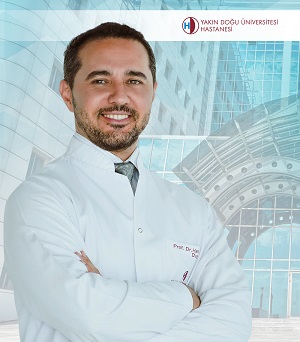
In recent years, the frequency of sudden deaths in people without any diagnosed disease has been increasing rapidly. Emphasizing that the most important cause of such sudden deaths is heart diseases, Near East University Hospital Cardiology Department Head Prof. Dr. Hamza Duygu warns that necessary precautions should be taken against possible heart diseases, especially in this period of increasing summer heat.
Deaths that occur unexpectedly and shortly after the onset of symptoms due to cardiac arrest in people who do not have a fatal disease are defined as “Sudden Cardiac Death”. Prof. Dr. Hamza Duygu, stating that this situation often occurs with the emergence of lethal rhythm disorders, says that the reason why death occurs within at least 1 or 2 hours is usually due to the arrhythmia problem. Prof. Dr. Duygu draws attention to the fact that in deaths that occur within hours, cardiac function deteriorates and the heart suffers from pump failure.
If you are over 30, have a regular heart Check-Up once a year
Stating that the main cause of sudden cardiac death is a heart attack due to cardiovascular occlusion, Prof. Dr. Hamza Duygu pointed out that death is usually caused by a heart rhythm disorder that develops during a heart attack. Prof. Dr. Hamza Duygu commented on as follows: “During this fatal rhythm disorder called ventricular fibrillation, the heart cannot fulfill its pumping function and blood flow is cut off. If the heart rhythm is not returned to normal by electroshock within minutes, death occurs. Therefore, conditions such as hypertension, diabetes, high cholesterol, smoking and family history that increase the risk of coronary artery disease are also risk factors for sudden cardiac death.
Stating that the most common symptoms before the development of sudden cardiac symptoms are shortness of breath, palpitations, darkening in the eyes, and a feeling of badness, Prof. Dr. Hamza Duygu said that sometimes the heart can stop suddenly without any symptoms. Prof. Dr. Hamza Duygu stated that everyone over the age of 30 should undergo a regular heart health screening once a year in order to avoid the bad consequences of heart diseases that did not show any symptoms before.
People with sudden death in their family should be careful!
Reminding that people who have a death case due to sudden cardiac arrest, especially in their family, should apply to a fully equipped heart center as soon as possible. Prof. Dr. Hamza Duygu said that there are various screening programs regarding heart health at the Near East University Hospital Heart Center. Emphasizing that pilots, drivers, safety officers and athletes who have great responsibility for their work, should regularly undergo a detailed heart health screening program. Prof. Dr. Hamza Duygu stated that by detecting conditions that cause sudden death, such as cardiovascular occlusion, aortic dilatation, arrhythmia, heart failure, congenital heart disease, sudden cardiac death can be prevented with early diagnosis. Prof. Dr. Hamza Duygu continued: “It is possible to prevent some cases by having regular check-ups. Rare familial genetic diseases can cause sudden death in healthy young individuals. In this respect, high-risk patients can be detected by various diagnostic methods. It is of great importance that those who have lost their close relatives due to sudden unexpected deaths are examined in a cardiology center.”
Conditions Increasing the Risk of Sudden Cardiac Death;
- Cardiovascular occlusions and related heart attacks
- Aortic rupture
- Pulmonary embolism
- Heart failure, congenital heart muscle diseases
- Heart valve diseases
- heart muscle inflammation
- Congenital heart diseases
- Use of toxic substances
- Some serious rhythm disorders (long QT syndrome, short QT syndrome, WPW syndrome, brugada syndrome, arrhythmogenic right ventricular dysplasia)